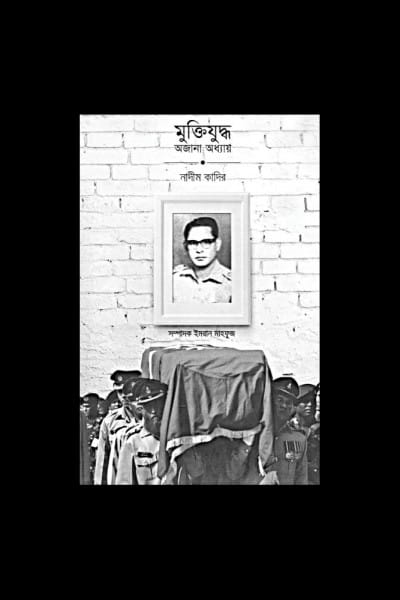Muktijuddha: Ojana Oddhay

Soon after I met journalist-writer Nadeem Qadir in Dhaka, way back in 1991, I heard about his being the son of a senior officer in the Pakistani army who had opted for an independent Bangladesh during the 1971 Liberation War and had gone missing, presumably killed either by Pakistani occupation forces or their collaborators in the then East Pakistan. The truth was not known then. During my five-year posting as a journalist in Dhaka from January, 1991, I became close to Nadeem but it was only after reading his latest book that I could fully fathom the extent of the huge personal tragedy of a son's desperate search for the whereabouts of his martyred father, Lt. Col Muhammad Abdul Qadir, who was taken away by Pakistani troops from his house in Chittagong, never to return and of the pain of locating his mortal remains and getting due state recognition for him. It was not just the wait for Nadeem alone but also his family, especially his mother Hasna Hena Qadir, that makes the account so tragic. As the book tells us, she could never reconcile herself to the killing of her husband.
Muktijuddha: Ojana Oddhay, running into 110 pages, is structured mainly in the form of Nadeem Qadir's own accounts of his father, from 1968 when the latter was posted in Rawalpindi, down to his killing in Chittagong's Paanchlaish area on April 17, 1971. It narrates how he ran from pillar to post in the corridors of power in Bangladesh to locate the mortal remains of Lt Col Abdul Qadir and relocate them at a proper place with full state honours at a cantonment in Natore, which has now been named after the slain army officer. A part of Quadir's book is derived from what he heard about his father during the turbulent months of 1971 from Hasna Hena Qadir since the author was merely ten years old at that time. The book also contains a seven-page write-up by the veteran journalist Samaresh Baidya, who is based in Chittagong, and who assisted Quadir in looking for his father's mortal remains in Chittagong.
Nadeem Qadir, now Minister (Press) in the Bangladesh High Commission in London, tells the readers that he began his search for his father in 1977. He also narrates how he got the main lead to the place where Lt Col Qadir was buried along with others from the book Bangalir Jatiyotabadi Sangram, Muktijuddhey Chattagram by the eminent doctor, DrMahfuzur Rahman, who has done extensive research on the Liberation War. Quadir also reveals how during his painstaking search for his father's mortal remains, some people, whose role during the Liberation War was controversial, tried to divert him from the whole effort. One only wishes, he could name these people!
Quadir's book informs the readers how his father, on taking a voluntary transfer to Chittagong in 1970 from Rawalpindi, started working clandestinely for Bangladesh's Liberation War by meeting like-minded Bengali military officers and writing a letter to Awami League leader A H M Kamruzzaman, who was assassinated in a Dhaka jail on November 3, 1975. Lt Col Abdul Qadir, the book suggests, was convinced that an independent Bangladesh would be born. He went about doing work for the Liberation War, defying the words of caution uttered by his wife and threats from local non-Bengalis who watched him unfurl the Bangladesh national flag. Abdul Qadir was already under the scanner of the Pakistani army for this gesture.
Recalling what he had heard from Hasna Hena Qadir, one of the founders of Ekattorer Ghatak Dalal Nirmul Committee, Quadir writes that Ziaur Rahman, then a Major, and his wife Begum Khaleda Zia, had come to the house of the Qadirs, either on March 21 or 22, 1971 and had discussed the course of events that could then unfold. While Begum Zia and Hasna Hena were seated in the dining room, Abdul Qadir and Zia conversed the drawing room. "My mother told me that Ziaur Rahman had disagreed with my father on the Liberation War. That day, Ziaur Rahman had told my father that there was no guaranteeing that an independent Bangladesh would be born," Quadir quotes his mother as saying. According to Quadir, his father had told Hasna Hena that "Ziaur Rahman was a very good officer and it would have been better had he been with us."
Quadir's book gives us a gripping account of how a Pakistani army captain, accompanied by 10-12 soldiers, virtually barged into Lt Col Qadir's house in Chittagong on the morning of April 17, 1971, took his father away and put him into a Pakistani navy jeep. Lt Col Qadir, a Bengali officer of the Engineering Corps of Pakistani army on deputation to the Oil and Gas Development Corporation, had supplied the explosives which were used to blow up Subhapur bridge in Comilla, thereby affecting the movement of the Pakistani army. An interesting nugget of information Quadir's book gives quoting Maj (Retd) Rafiqul Islam (Bir Uttam) is that Lt Col Abdul Qadir could have had the distinction of reading out on the radio Bangabandhu Sheikh Mujibur Rahman's independence declaration had he been able to come out of his house on time. Instead, it fell on Ziaur Rahman to read out the declaration.
Quadir notes that his book is not an autobiography but that a large part of it consists of the life of the Qadir family from their move from Rawalpindi in 1968 to 2013. It describes their struggle to live in Dhaka and narrates how Hasna Hena tried to secure a government job to bring up her two sons and a daughter and the stress in the relationship between the author and his sister over property. It also reveals how Quadir struggled against all sorts of odds to find his father's mortal remains. The racy style of Quadir makes most of the accounts riveting and the book unputdownable.
What makes Muktijuddha: Oajana Oddhay a valuable addition to the compendium of literature on the Bangladesh Liberation War are the two messages it sends out: (1) that there are still many unsung persons whose contributions to the independence of Bangladesh need to be given due recognition; and (2) that there remains influential quarters in Bangladesh who would like to thwart it. It is on this note that the book leaves the readers to ruminate on the future of the country.
Pallab Bhattacharya writes for The Daily Star from Delhi.

 For all latest news, follow The Daily Star's Google News channel.
For all latest news, follow The Daily Star's Google News channel. 



Comments